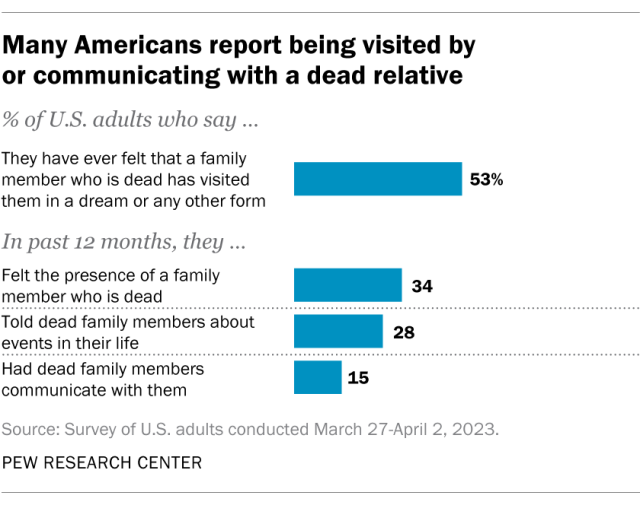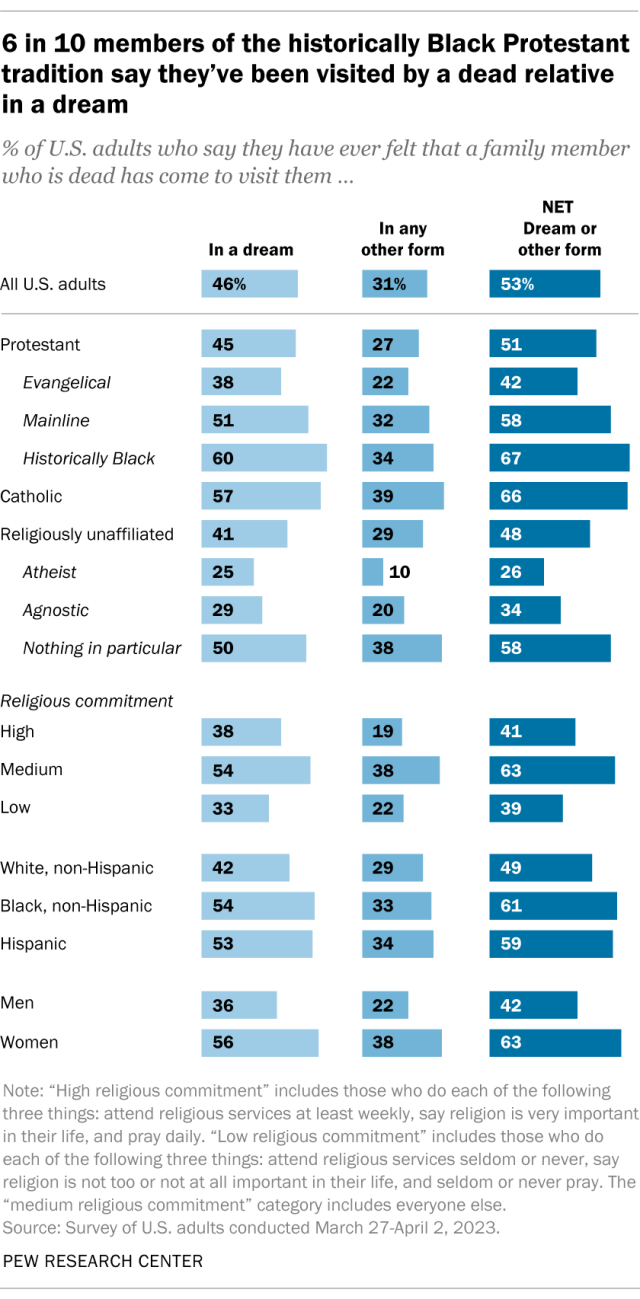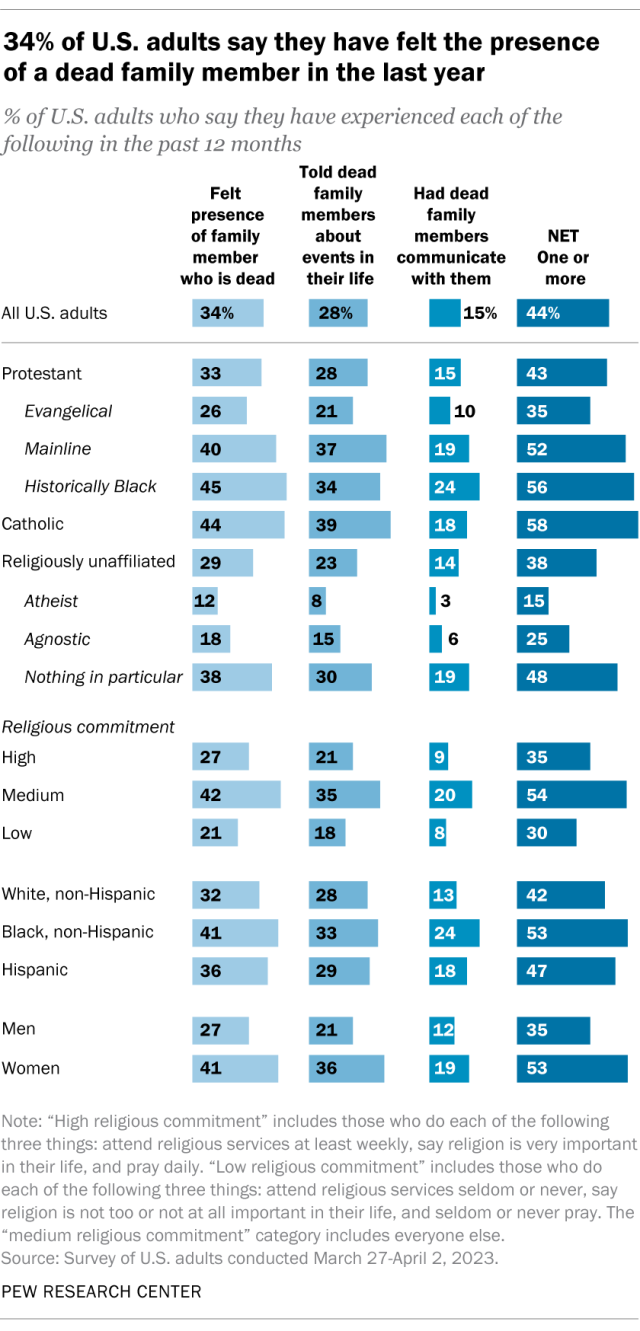
Pew Research Center conducted this analysis as part of ongoing research to explore both adherence to traditional, organized religions and less formal, more individualized spiritual beliefs and practices in the United States. The survey, which included 5,079 U.S. adults, was conducted March 27-April 2, 2023. All respondents to the survey are part of the Center’s American Trends Panel (ATP), an online survey panel that is recruited through national random sampling of residential addresses. This way nearly all U.S. adults have a chance of selection. The survey is weighted to be representative of the U.S. adult population by gender, race, ethnicity, partisan affiliation, education, religious affiliation and other categories. Read more about the ATP’s methodology.
Here are the questions used in this analysis, along with responses, and the survey methodology.
Many Americans report that their relationships with loved ones continue past death in some way, according to a recent Pew Research Center survey.

Around half of U.S. adults (53%) say they’ve ever been visited by a dead family member in a dream or some other form. And substantial shares say they’ve had interactions with dead relatives in the past 12 months:
- 34% have “felt the presence” of a dead relative
- 28% have told a dead relative about their life
- 15% have had a dead family member communicate with them
In total, 44% of Americans report having at least one of these three experiences in the past year.
Women are more likely than men to say they have had these kinds of interactions with dead family members. And people who are moderately religious are more likely than others – including those who are highly religious and those who are not religious – to have experienced these things.
The survey was conducted March 27-April 2, 2023, among 5,079 adults on the Center’s American Trends Panel. It included Americans of all religious backgrounds, including Jews, Muslims, Buddhists and Hindus. But there are not enough respondents from these smaller groups to report on their answers separately.
While the survey asked whether people have had interactions with dead relatives, it did not ask for explanations. We don’t know whether people view these experiences as mysterious or supernatural, or whether they see them as having natural or scientific causes, or some of both.
For example, the survey did not ask what respondents meant when they said they had been visited in a dream by a dead relative. Some might have meant that relatives were trying to send them messages or information from beyond the grave. Others might have had something more commonplace in mind, such as having dreamt about a favorite memory of a family member.
Experiences with being visited by a dead relative

Overall, 46% of Americans report that they’ve been visited by a dead family member in a dream, while 31% report having been visited by dead relatives in some other form.
Roughly two-thirds of Catholics (66%) and members of the historically Black Protestant tradition (67%) have ever experienced a visit from a deceased family member in some form. Evangelical Protestants are far less likely to say the same (42%).
Roughly half (48%) of Americans who are religiously unaffiliated – atheists, agnostics, and those who report their religion is “nothing in particular” – say they have ever been visited by a dead relative in a dream or other form. However, those who describe their religion as nothing in particular are much more likely to say they have ever been visited by a deceased loved one (58%) than are agnostics (34%) and atheists (26%).
Recent contact with deceased relatives

When asked about recent experiences – things that have happened in the last 12 months – 34% of Americans say they have felt the presence of a dead family member and 28% say they have told dead family members about events in their life. Fewer respondents (15%) say a deceased family member has communicated with them in the past year.
Women are more likely than men to say they had at least one of these three experiences in the last year (53% vs. 35%). For example, women are more likely than men to say they recently have felt the presence of a dead family member (41% vs. 27%).
When it comes to religion, about half or more of Catholics (58%), members of the historically Black Protestant tradition (56%) and mainline Protestants (52%) say they have had at least one of these three experiences in the last year – significantly more than the 35% of evangelical Protestants who say the same.
Relatively few atheist (15%) or agnostic (25%) adults report any of these experiences over the last 12 months. In contrast, roughly half (48%) of those who say their religion is nothing in particular reported one of these experiences.
These experiences also differ by Americans’ religious commitment, as measured by a scale that includes indicators of religious service attendance, prayer frequency and self-assessments of religion’s importance in one’s life.
Americans with medium levels of religious commitment are more likely than those with either higher or lower levels of religious commitment to say they’ve felt the presence of a family member who is dead, told a dead family member about events in their life, and felt a dead relative communicate with them in the past year.
Summing up this pattern in another way: People who are moderately religious seem to be more likely than other Americans to have these experiences. This is partly because some of the most traditionally religious groups – such as evangelical Protestants – as well as some of the least religious parts of the population – such as atheists and agnostics – are less likely to report having interactions with deceased family members.
Note: Here are the questions used in this analysis, along with responses, and the survey methodology.

